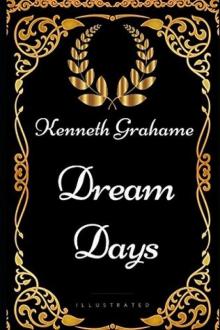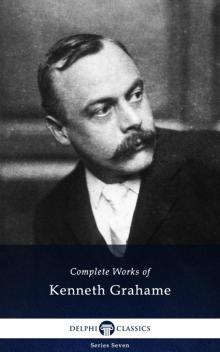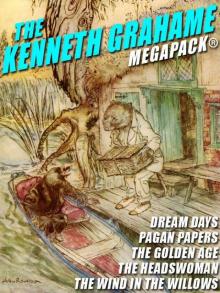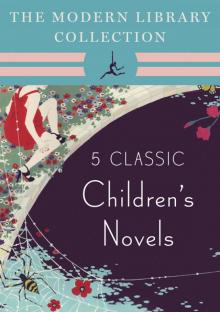- Home
- Kenneth Grahame
The Kenneth Grahame Megapack Page 23
The Kenneth Grahame Megapack Read online
Page 23
So the luckless Harold was hauled out of bed and given his sailing-orders. He was naturally rather vexed at being stood up suddenly on the cold floor, and the job had no particular interest for him; but he was both staunch and well disciplined. The means of exit were simple enough. A porch of iron trellis came up to within easy reach of the window, and was habitually used by all three of us, when modestly anxious to avoid public notice. Harold climbed deftly down the porch like a white rat, and his night-gown glimmered a moment on the gravel walk ere he was lost to sight in the darkness of the shrubbery. A brief interval of silence ensued; broken suddenly by a sound of scuffle, and then a shrill long-drawn squeal, as of metallic surfaces in friction. Our scout had fallen into the hands of the enemy!
Indolence alone had made us devolve the task of investigation on our younger brother. Now that danger had declared itself, there was no hesitation. In a second we were down the side of the porch, and crawling Cherokee-wise through the laurels to the back of the garden-seat. Piteous was the sight that greeted us. Aunt Maria was on the seat, in a white evening frock, looking—for an aunt—really quite nice. On the lawn stood an incensed curate, grasping our small brother by a large ear, which—judging from the row he was making—seemed on the point of parting company with the head it completed and adorned. The gruesome noise he was emitting did not really affect us otherwise than æsthetically. To one who has tried both, the wail of genuine physical anguish is easily distinguishable from the pumped-up ad misericordiam blubber. Harold’s could clearly be recognised as belonging to the latter class. ‘Now you young—’ (whelp, I think it was, but Edward stoutly maintains it was devil), said the curate sternly; ‘tell us what you mean by it!’
‘Well leggo of my ear then!’ shrilled Harold, ‘and I’ll tell you the solemn truth!’
‘Very well,’ agreed the curate, releasing him, ‘now go ahead, and don’t lie more than you can help.’
We abode the promised disclosure without the least misgiving; but even we had hardly given Harold due credit for his fertility of resource and powers of imagination.
‘I had just finished saying my prayers,’ began that young gentleman slowly, ‘when I happened to look out of the window, and on the lawn I saw a sight which froze the marrow in my veins! A burglar was approaching the house with snake-like tread! He had a scowl and a dark lantern, and he was armed to the teeth!’
We listened with interest. The style, though unlike Harold’s native notes, seemed strangely familiar.
‘Go on,’ said the curate grimly.
‘Pausing in his stealthy career,’ continued Harold, ‘he gave a low whistle. Instantly the signal was responded to, and from the adjacent shadows two more figures glided forth. The miscreants were both armed to the teeth.’
‘Excellent,’ said the curate; ‘proceed.’
‘The robber chief,’ pursued Harold, warming to his work, ‘joined his nefarious comrades, and conversed with them in silent tones. His expression was truly ferocious, and I ought to have said that he was armed to the t—’
‘There, never mind his teeth,’ interrupted the curate rudely; ‘there’s too much jaw about you altogether. Hurry up and have done.’
‘I was in a frightful funk,’ continued the narrator, warily guarding his ear with his hand, ‘but just then the drawing-room window opened, and you and Aunt Maria came out—I mean emerged. The burglars vanished silently into the laurels, with horrid implications!’
The curate looked slightly puzzled. The tale was well sustained, and certainly circumstantial. After all, the boy might really have seen something. How was the poor man to know—though the chaste and lofty diction might have supplied a hint—that the whole yarn was a free adaptation from the last Penny Dreadful lent us by the knife-and-boot boy?
‘Why did you not alarm the house?’ he asked.
‘Cos I was afraid,’ said Harold sweetly, ‘that p’raps they mightn’t believe me!’
‘But how did you get down here, you naughty little boy?’ put in Aunt Maria.
Harold was hard pressed—by his own flesh and blood, too!
At that moment Edward touched me on the shoulder and glided off through the laurels. When some ten yards away he gave a low whistle. I replied with another. The effect was magical. Aunt Maria started up with a shriek. Harold gave one startled glance around, and then fled like a hare, made straight for the back-door, burst in upon the servants at supper, and buried himself in the broad bosom of the cook, his special ally. The curate faced the laurels—hesitatingly. But Aunt Maria flung herself on him. ‘O Mr. Hodgitts!’ I heard her cry, ‘you are brave! for my sake do not be rash!’ He was not rash. When I peeped out a second later, the coast was entirely clear.
By this time there were sounds of a household timidly emerging; and Edward remarked to me that perhaps we had better be off. Retreat was an easy matter. A stunted laurel gave a leg-up on to the garden wall, which led in its turn to the roof of an out-house, up which, at a dubious angle, we could crawl to the window of the box-room. This overland route had been revealed to us one day by the domestic cat, when hard pressed in the course of an otter-hunt, in which the cat—somewhat unwillingly—was filling the title rôle; and it had proved distinctly useful on occasions like the present. We were snug in bed—minus some cuticle from knees and elbows—and Harold, sleepily chewing something sticky, had been carried up in the arms of the friendly cook, ere the clamour of the burglar-hunters had died away.
The curate’s undaunted demeanour, as reported by Aunt Maria, was generally supposed to have terrified the burglars into flight, and much kudos accrued to him thereby. Some days later, however, when he had dropped in to afternoon tea, and was making a mild curatorial joke about the moral courage required for taking the last piece of bread-and-butter, I felt constrained to remark dreamily, and as it were to the universe at large: ‘Mr. Hodgitts! you are brave! for my sake, do not be rash!’
Fortunately for me, the vicar also was a caller on that day; and it was always a comparatively easy matter to dodge my long-coated friend in the open.
A HARVESTING
The year was in its yellowing time, and the face of Nature a study in old gold. ‘A field or, semée with garbs of the same:’ it may be false Heraldry—Nature’s generally is—but it correctly blazons the display that Edward and I considered from the rickyard gate. Harold was not on in this scene, being stretched upon the couch of pain: the special disorder stomachic, as usual. The evening before, Edward, in a fit of unwonted amiability, had deigned to carve me out a turnip lantern, an art-and-craft he was peculiarly deft in; and Harold, as the interior of the turnip flew out in scented fragments under the hollowing knife, had eaten largely thereof: regarding all such jetsam as his special perquisite. Now he was dreeing his weird, with such assistance as the chemist could afford. But Edward and I, knowing that this particular field was to be carried today, were revelling in the privilege of riding in the empty waggons from the rickyard back to the sheaves, whence we returned toilfully on foot, to career it again over the billowy acres in these great galleys of a stubble sea. It was the nearest approach to sailing that we inland urchins might compass: and hence it ensued, that such stirring scenes as Sir Richard Grenville on the Revenge, the smoke-wreathed Battle of the Nile, and the Death of Nelson, had all been enacted in turn on these dusty quarter-decks, as they swayed and bumped afield.
Another waggon had shot its load, and was jolting out through the rickyard gate, as we swung ourselves in, shouting, over its tail. Edward was the first up, and, as I gained my feet, he clutched me in a death-grapple. I was a privateersman, he proclaimed, and he the captain of the British frigate Terpsichore, of—I forget the precise number of guns. Edward always collared the best parts to himself; but I was holding my own gallantly, when I suddenly discovered that the floor we battled on was swarming with earwigs. Shrieking, I hurled free of him, and rolled over th
e tail-board on to the stubble. Edward executed a war-dance of triumph on the deck of the retreating galleon; but I cared little for that. I knew he knew that I wasn’t afraid of him, but that I was—and terribly—of earwigs: ‘those mortal bugs o’ the field.’ So I let him disappear, shouting lustily for all hands to repel boarders, while I strolled inland, down the village.
There was a touch of adventure in the expedition. This was not our own village, but a foreign one, distant at least a mile. One felt that sense of mingled distinction and insecurity which is familiar to the traveller: distinction, in that folk turned the head to note you curiously; insecurity, by reason of the ever-present possibility of missiles on the part of the younger inhabitants, a class eternally Conservative. Elated with isolation, I went even more nose-in-air than usual: and ‘even so,’ I mused, ‘might Mungo Park have threaded the trackless African forest and.…’ Here I plumped against a soft, but resisting body.
Recalled to my senses by the shock, I fell back in the attitude every boy under these circumstances instinctively adopts—both elbows well up over your ears. I found myself facing a tall elderly man, clean-shaven, clad in well-worn black—a clergyman evidently; and I noted at once a far-away look in his eyes, as if they were used to another plane of vision, and could not instantly focus things terrestrial, being suddenly recalled thereto. His figure was bent in apologetic protest. ‘I ask a thousand pardons, sir,’ he said; ‘I am really so very absent-minded. I trust you will forgive me.’
Now most boys would have suspected chaff under this courtly style of address. I take infinite credit to myself for recognising at once the natural attitude of a man to whom his fellows were gentlemen all, neither Jew nor Gentile, clean nor unclean. Of course, I took the blame on myself; adding, that I was very absent-minded too. Which was indeed the case.
‘I perceive,’ he said pleasantly, ‘that we have something in common. I, an old man, dream dreams; you, a young one, see visions. Your lot is the happier. And now—’ his hand had been resting all this time on a wicket-gate—‘you are hot, it is easily seen;—the day is advanced, Virgo is the Zodiacal sign. Perhaps I may offer you some poor refreshment, if your engagements will permit?’
My only engagement that afternoon was an arithmetic lesson, and I had not intended to keep it in any case; so I passed in, while he held the gate open politely, murmuring, ‘Venit Hesperus, ite capellæ: come, little kid!’ and then apologising abjectly for a familiarity which (he said) was less his than the Roman poet’s. A straight flagged walk led up to the cool-looking old house, and my host, lingering in his progress at this rose-tree and that, forgot all about me at least twice, waking up and apologising humbly after each lapse. During these intervals I put two and two together, and identified him as the Rector: a bachelor, eccentric, learned exceedingly, round whom the crust of legend was already beginning to form; to myself an object of special awe, in that he was alleged to have written a real book. ‘Heaps o’ books,’ Martha, my informant, said; but I knew the exact rate of discount applicable to Martha’s statements.
We passed eventually through a dark hall into a room which struck me at once as the ideal I had dreamed but failed to find. None of your feminine fripperies here! None of your chair-backs and tidies! This man, it was seen, groaned under no aunts. Stout volumes in calf and vellum lined three sides; books sprawled or hunched themselves on chairs and tables; books diffused the pleasant odour of printers’ ink and bindings; topping all, a faint aroma of tobacco cheered and heartened exceedingly, as under foreign skies the flap and rustle over the wayfarer’s head of the Union Jack—the old flag of emancipation! And in one corner, book-piled like the rest of the furniture, stood a piano.
This I hailed with a squeal of delight. ‘Want to strum?’ inquired my friend, as if it was the most natural wish in the world—his eyes were already straying towards another corner, where bits of writing-table peeped out from under a sort of Alpine system of book and foolscap.
‘O but may I?’ I asked in doubt. ‘At home I’m not allowed to—only beastly exercises!’
‘Well, you can strum here, at all events,’ he replied; and murmuring absently, ‘Age, dic Latinum, barbite, carmen,’ he made his way, mechanically guided as it seemed, to the irresistible writing-table. In ten seconds he was out of sight and call. A great book open on his knee, another propped up in front, a score or so disposed within easy reach, he read and jotted with an absorption almost passionate. I might have been in Bœotia, for any consciousness he had of me. So with a light heart I turned to and strummed.
Those who painfully and with bleeding feet have scaled the crags of mastery over musical instruments have yet their loss in this: that the wild joy of strumming has become a vanished sense. Their happiness comes from the concord and the relative value of the notes they handle: the pure, absolute quality and nature of each note in itself are only appreciated by the strummer. For some notes have all the sea in them, and some cathedral bells; others a woodland joyance and a smell of greenery; in some fauns dance to the merry reed, and even the grave centaurs peep out from their caves. Some bring moonlight, and some the deep crimson of a rose’s heart; some are blue, some red, while others will tell of an army with silken standards and march-music. And throughout all the sequence of suggestion, up above the little white men leap and peep, and strive against the imprisoning wires; and all the big rosewood box hums as it were full of hiving bees.
Spent with the rapture, I paused a moment and caught my friend’s eye over the edge of a folio. ‘But as for these Germans,’ he began abruptly, as if we had been in the middle of a discussion, ‘the scholarship is there, I grant you; but the spark, the fine perception, the happy intuition, where is it? They get it all from us!’
‘They get nothing whatever from us,’ I said decidedly: the word German only suggesting Bands, to which Aunt Eliza was bitterly hostile.
‘You think not?’ he rejoined doubtfully, getting up and walking about the room. ‘Well, I applaud such fairness and temperance in so young a critic. They are qualities—in youth—as rare as they are pleasing. But just look at Schrumpffius, for instance—how he struggles and wrestles with a simple γἁρ in this very passage here!’
I peeped fearfully through the open door, half-dreading to see some sinuous and snark-like conflict in progress on the mat; but all was still. I saw no trouble at all in the passage, and I said so.
‘Precisely,’ he cried, delighted. ‘To you, who possess the natural scholar’s faculty in so happy a degree, there is no difficulty at all. But to this Schrumpffius—’ But here, luckily for me, in came the housekeeper, a clean-looking woman of staid aspect.
‘Your tea is in the garden,’ she said severely, as if she were correcting a faulty emendation. ‘I’ve put some cakes and things for the little gentleman; and you’d better drink it before it gets cold.’
He waved her off and continued his stride, brandishing an aorist over my devoted head. The housekeeper waited unmoved till there fell a moment’s break in his descant; and then, ‘You’d better drink it before it gets cold,’ she observed again, impassively. The wretched man cast a deprecating look at me. ‘Perhaps a little tea would be rather nice,’ he observed feebly; and to my great relief he led the way into the garden. I looked about for the little gentleman, but, failing to discover him, I concluded he was absent-minded too, and attacked the ‘cakes and things’ with no misgivings.
After a most successful and most learned tea a something happened which, small as I was, never quite shook itself out of my memory. To us at parley in an arbour over the high road, there entered, slouching into view, a dingy tramp, satellited by a frowsy woman and a pariah dog; and, catching sight of us, he set up his professional whine; and I looked at my friend with the heartiest compassion, for I knew well from Martha—it was common talk—that at this time of day he was certainly and surely penniless. Morn by morn he started forth with pockets lined; and each ret
urning evening found him with never a sou. All this he proceeded to explain at length to the tramp, courteously and even shamefacedly, as one who was in the wrong; and at last the gentleman of the road, realising the hopelessness of his case, set to and cursed him with gusto, vocabulary, and abandonment. He reviled his eyes, his features, his limbs, his profession, his relatives and surroundings; and then slouched off, still oozing malice and filth. We watched the party to a turn in the road, where the woman, plainly weary, came to a stop. Her lord, after some conventional expletives demanded of him by his position, relieved her of her bundle, and caused her to hang on his arm with a certain rough kindness of tone, and in action even a dim approach to tenderness; and the dingy dog crept up for one lick at her hand.
‘See,’ said my friend, bearing somewhat on my shoulder, ‘how this strange thing, this love of ours, lives and shines out in the unlikeliest of places! You have been in the fields in early morning? Barren acres, all! But only stoop—catch the light thwartwise—and all is a silver network of gossamer! So the fairy filaments of this strange thing underrun and link together the whole world. Yet it is not the old imperious god of the fatal bow—ἑρως ανἱκατε μἁχαν—not that—nor even the placid respectable στοργἡ—but something still unnamed, perhaps more mysterious, more divine! Only one must stoop to see it, old fellow, one must stoop!’
The dew was falling, the dusk closing, as I trotted briskly homewards down the road. Lonely spaces everywhere, above and around. Only Hesperus hung in the sky, solitary, pure, ineffably far-drawn and remote; yet infinitely heartening, somehow, in his valorous isolation.
SNOWBOUND
Twelfth-night had come and gone, and life next morning seemed a trifle flat and purposeless. But yester-eve, and the mummers were here! They had come striding into the old kitchen, powdering the red brick floor with snow from their barbaric bedizenments; and stamping, and crossing, and declaiming, till all was whirl and riot and shout. Harold was frankly afraid: unabashed, he buried himself in the cook’s ample bosom. Edward feigned a manly superiority to illusion, and greeted these awful apparitions familiarly, as Dick and Harry and Joe. As for me, I was too big to run, too rapt to resist the magic and surprise. Whence came these outlanders, breaking in on us with song and ordered masque and a terrible clashing of wooden swords? And after these, what strange visitants might we not look for any quiet night, when the chestnuts popped in the ashes, and the old ghost stories drew the awe-stricken circle close? Old Merlin, perhaps, ‘all furred in black sheep-skins, and a russet gown, with a bow and arrows, and bearing wild geese in his hand!’ Or stately Ogier the Dane, recalled from Faëry, asking his way to the land that once had need of him! Or even, on some white night, the Snow-Queen herself, with a chime of sleigh-bells and the patter of reindeer’s feet, halting of a sudden at the door flung wide, while aloft the Northern Lights went shaking attendant spears among the quiet stars!

 The Wind in the Willows
The Wind in the Willows Dream Days
Dream Days Complete Works of Kenneth Grahame
Complete Works of Kenneth Grahame The Kenneth Grahame Megapack
The Kenneth Grahame Megapack The Modern Library Children's Classics
The Modern Library Children's Classics